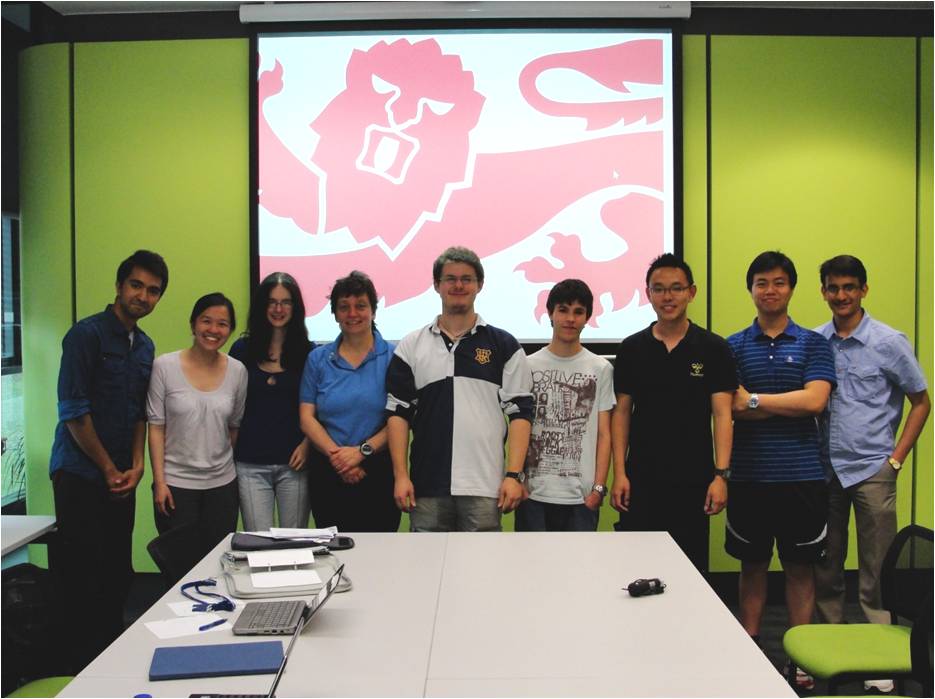Team:Newcastle
From 2010.igem.org
Swoodhouse (Talk | contribs) (→Project Description) |
Swoodhouse (Talk | contribs) (→Project Description) |
||
| Line 10: | Line 10: | ||
BacillaFilla, an engineered ''Bacillus subtilis'', aims to repair [[Team:Newcastle/problem|cracks in concrete]], which can cause catastrophic structural failure. BacillaFilla would be applied to structures by spraying onto their surface. | BacillaFilla, an engineered ''Bacillus subtilis'', aims to repair [[Team:Newcastle/problem|cracks in concrete]], which can cause catastrophic structural failure. BacillaFilla would be applied to structures by spraying onto their surface. | ||
| - | BacillaFilla swims deep into the cracks. Repair is effected by production of CaCO<sub>3</sub>, [[Team:Newcastle/Filamentous_Cells| filamentous ''Bacillus subtilis'' cells]] and [[Team:Newcastle/glue| | + | BacillaFilla swims deep into the cracks. Repair is effected by production of [[Team:Newcastle/Urease|CaCO<sub>3</sub>]], [[Team:Newcastle/Filamentous_Cells|filamentous ''Bacillus subtilis'' cells]] and [[Team:Newcastle/glue|levan]]. CaCO<sub>3</sub> expands at the same rate as concrete, making it the ideal filler. Filamentous ''Bacillus subtilis'' cells have similar tensile strength to the synthetic fibres used in fibre-reinforced concrete, and provide reinforcement. Levan glues CaCO<sub>3</sub> and filamentous cells in place. |
| + | |||
''B. subtilis'' 168 sporulates, making it ideal for storage and transportation. The cells are naturally tolerant to concrete's high pH. We designed a swarming part for repairing ''B. subtilis'' 168's defective [[Team:Newcastle/Swarming|swrA and sfp]] genes and regaining motility. At the end of the crack the quorum sensing peptide [[Team:Newcastle/End_of_crack_%26_signalling_system|subtilin]] triggers a co-ordinated population response from a [[Team:Newcastle/End_of_crack_%26_signalling_system#2008Brick|subtilin-inducible promoter]]. Upregulating SR1 and rocF promotes arginine and urea production, increasing exogenous CaCO<sub>3</sub> deposition. Over-producing YneA induces the filamentous cell phenotype, while SacB converts extracellular sucrose to levansucrose glue. | ''B. subtilis'' 168 sporulates, making it ideal for storage and transportation. The cells are naturally tolerant to concrete's high pH. We designed a swarming part for repairing ''B. subtilis'' 168's defective [[Team:Newcastle/Swarming|swrA and sfp]] genes and regaining motility. At the end of the crack the quorum sensing peptide [[Team:Newcastle/End_of_crack_%26_signalling_system|subtilin]] triggers a co-ordinated population response from a [[Team:Newcastle/End_of_crack_%26_signalling_system#2008Brick|subtilin-inducible promoter]]. Upregulating SR1 and rocF promotes arginine and urea production, increasing exogenous CaCO<sub>3</sub> deposition. Over-producing YneA induces the filamentous cell phenotype, while SacB converts extracellular sucrose to levansucrose glue. | ||
Revision as of 19:36, 25 October 2010

| |||||||||||||
| |||||||||||||
BacillaFilla: Fixing cracks in Concrete
Project Description
BacillaFilla, an engineered Bacillus subtilis, aims to repair cracks in concrete, which can cause catastrophic structural failure. BacillaFilla would be applied to structures by spraying onto their surface.
BacillaFilla swims deep into the cracks. Repair is effected by production of CaCO3, filamentous Bacillus subtilis cells and levan. CaCO3 expands at the same rate as concrete, making it the ideal filler. Filamentous Bacillus subtilis cells have similar tensile strength to the synthetic fibres used in fibre-reinforced concrete, and provide reinforcement. Levan glues CaCO3 and filamentous cells in place.
B. subtilis 168 sporulates, making it ideal for storage and transportation. The cells are naturally tolerant to concrete's high pH. We designed a swarming part for repairing B. subtilis 168's defective swrA and sfp genes and regaining motility. At the end of the crack the quorum sensing peptide subtilin triggers a co-ordinated population response from a subtilin-inducible promoter. Upregulating SR1 and rocF promotes arginine and urea production, increasing exogenous CaCO3 deposition. Over-producing YneA induces the filamentous cell phenotype, while SacB converts extracellular sucrose to levansucrose glue.
To protect the environment our project will also include a design for a kill switch.
| | |
|---|---|
| Bronze: | We have designed our project together as a team and shared our ideas on the iGEM wiki, as well as registering new standard BioBrick parts on the Registry of Standard Biological Parts. Our BioBricks are novel and easily reusable within synthetic biology. We have submitted DNA for the new BioBrick Parts and Devices which can be viewed here. |
| Silver: | Our new BioBrick Part BBa_K174011 works as expected and so we have characterised its operation and documented our results on the iGEM wiki and the [http://partsregistry.org/Part:BBa_K174011 Registry] |
| Gold: | We have improved the existing BioBrick Part [http://partsregistry.org/Part:BBa_K090501 Pspac promoter] and documented our new information back on the Registry: [http://partsregistry.org/Part:BBa_K174004 BBa_K174004].We have also helped another iGEM team by sending UQ a mercury sensing model for their project along with a tutorial. |
 
|
 "
"
